-
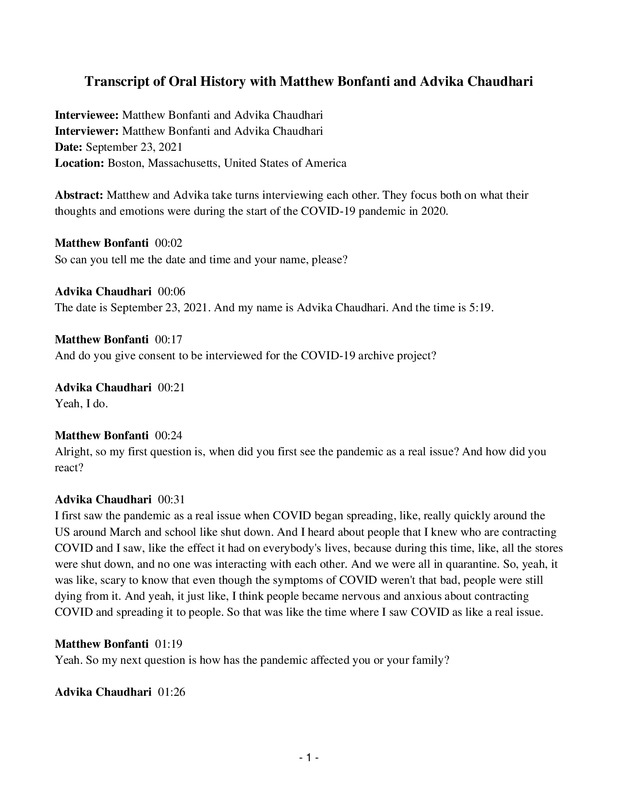
2021-09-23
This is important because it provides the experience of students who had to adapt to several changes during the pandemic who may have had different experiences.
-
2020-02-05
I have never experienced a pandemic like COVID-19, most of us have not. When we were told to stay home, quarantine and social distance life just became static. I moved into somewhat of a virtual reality, taking online classes and working from home. However, being home everyday without any socializing or going to the gym became really depressing and I had a hard time focusing on my work. One day my sister and I were sitting on the couch, over with pandemic life and she says "let's have a dance party". We blasted music throughout our apartment for hours and just danced all the pressure and stress out. We did this at least 3 times a week for months during the most difficult times of the pandemic. It became something we looked forward to. It was the best decision we have ever made. Not only could we destress but we had the time of our lives and it brought us closer as a family.
-
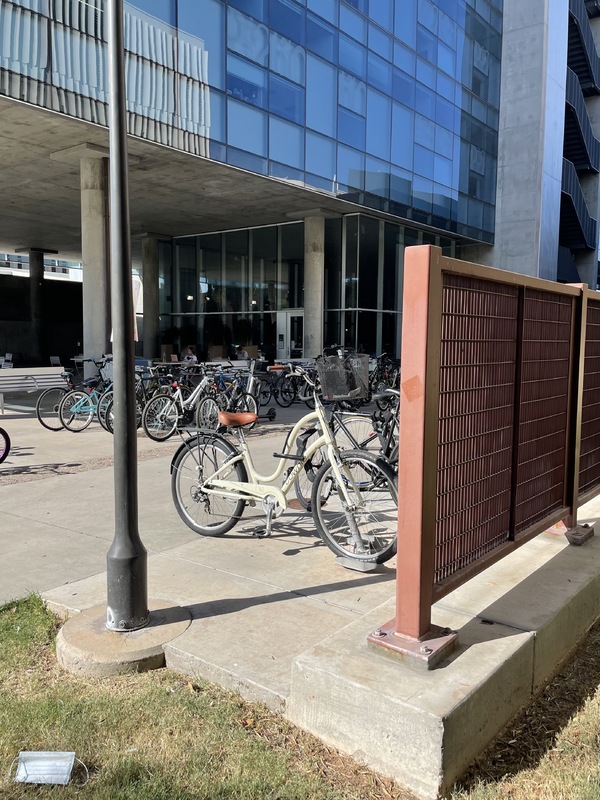
2021-09-22
A disposable mask was discarded/lost by the bike rack near the COOR building on campus.
-
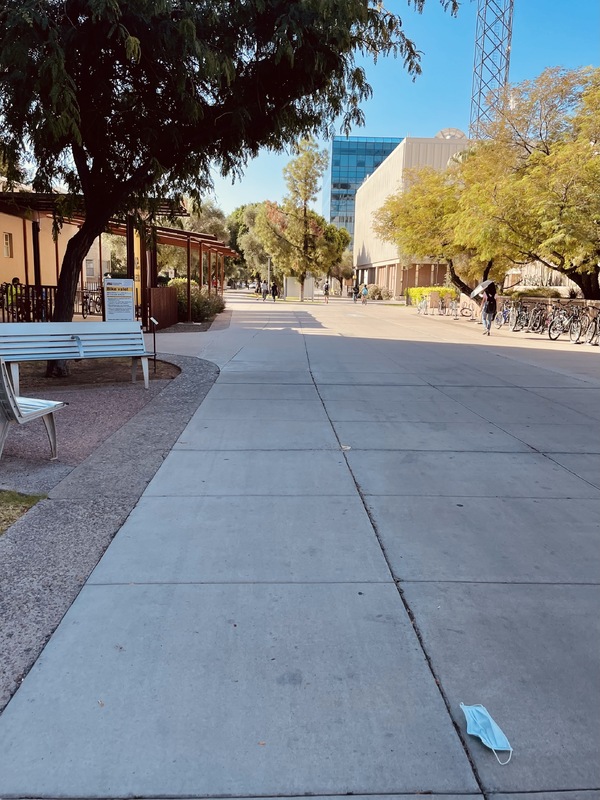
2021-09-23
A disposable mask on the ground early in the morning before 9AM classes begin.
-
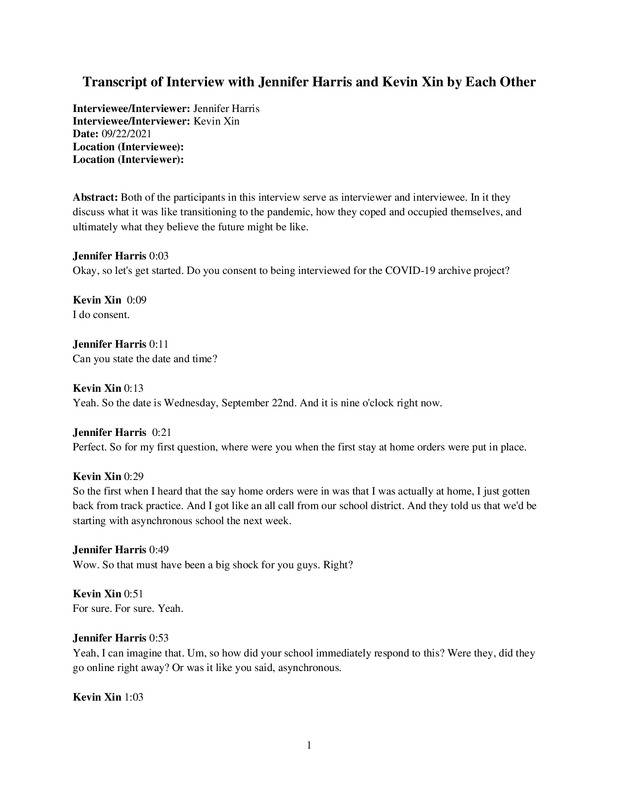
2021-09-22
The object of this story was for us to tell our unique experiences living through the COVID-19 pandemic. We think that our interview is a good representation of what life could be like during the pandemic for two average teenagers.
-
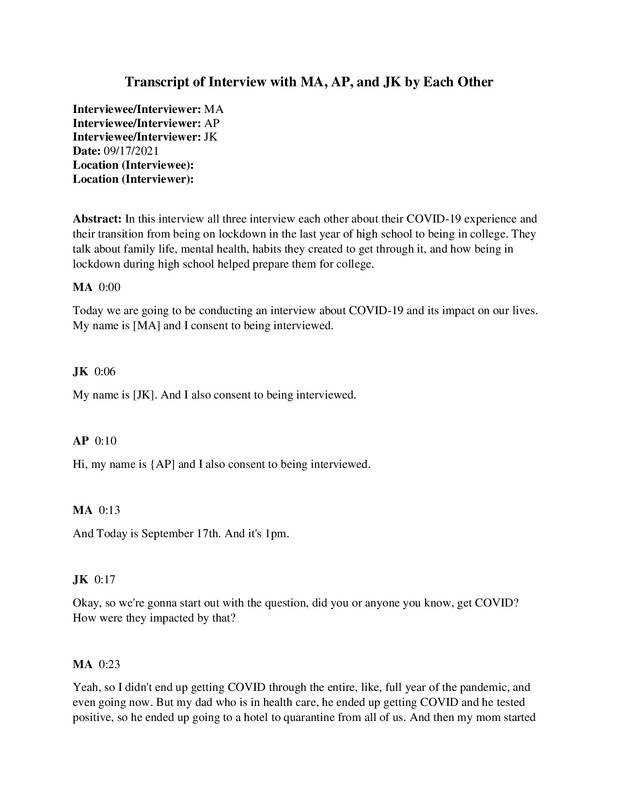
2021-09-17
This is a casual interview about the effects of COVID on mental health, academics, family life, etc. We discuss the biggest impact COVID had on us, our experience with the pandemic, what we did over quarantine, and much more, from the perspective of college freshmen.
-
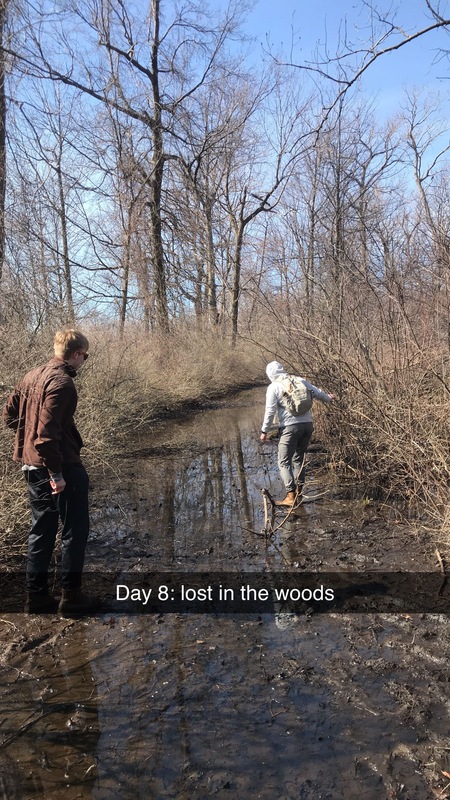
2020-03-07
When COVID-19 hit the states back in March of 2020, I was a freshman in college. I was sent home to and had to take the rest of my classes from home, for what we thought would be two weeks. Boy, was I wrong, two weeks turned into the longest and most memorable summer vacations of my life. When we had been sent home me and my three best friends wanted to make the most out of the time we were given, so we turned to our hobbies, which was fishing. Ever day I woke up earlier than I would have while at school. I found myself to be busier and more active during the pandemic due to all our fishing adventures. My relationships grew plentifully with my friends, and I was able to do well in school all at the same time. Throughout the pandemic I consider myself to be very lucky and blessed to not know anyone personally who had died from COVID-19, and I am beyond grateful for that. Not everyone is able to say the same. Even though I was active during the pandemic does not mean I did not take it seriously, we made sure to wear our masks, and practice social distancing. My friends and I decided that fishing would be the perfect activity to be safe while all still being together. We fished 7 days a week and gained so many new insightful skills and memories during our time. One fond memory that I have from the pandemic is when my friends and I went into a lagoon in the beginning of May when the ice had just melted, and the water was unbearably cold. At the time we didn’t have waders so we went in with whatever boots that we could find from home the water was much deeper than we had anticipated, by the time we made it through to our location that we wanted to fish in all our pants were soaked to our waists but that didn’t stop us from making it to our destination. I will never forget that day because it was a Tuesday in the middle of the day and we all had classes. It’s a great memory and I will never forget it because it was so unique compared to anything we have ever done in our lives prior to.
-
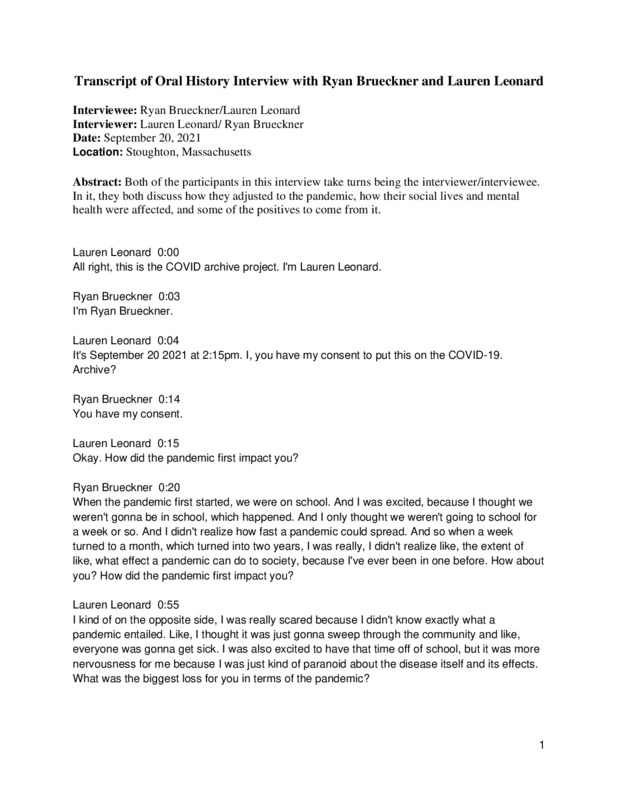
2021-09-20
A classmate and I interviewed each other about our first-hand experiences with COVID-19 in the past year and a half.
-
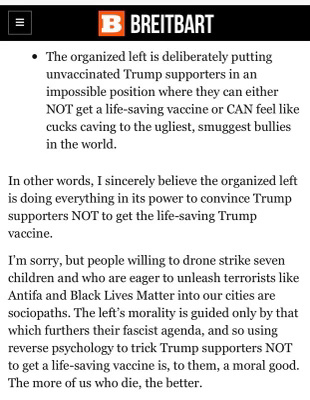
2021-09-22
I just can’t. I shit you not….. right wing nutters are now claiming that the organized left is doing everything they can to make sure the right does not get vaccinated… things such as vaccine Mandates…….. VACCINE MANDATES. He says the Biden Admin has instituted mandates in order to ensure that the right DOES NOT GET THEM. I’m so sick of the victim mentality exhibited by the far right. It’s so dangerous and the misinformation and disinformation being circulated on social media and right wing “news” is genuinely terrifying to me. I have family members who have refused to get vaccinated and I have begged them, BEGGED them to get vaccinated. So much that they refuse to talk to me about it. It’s lunacy to me that my efforts could be construed as “reverse psychology” to ensure their deaths.
-
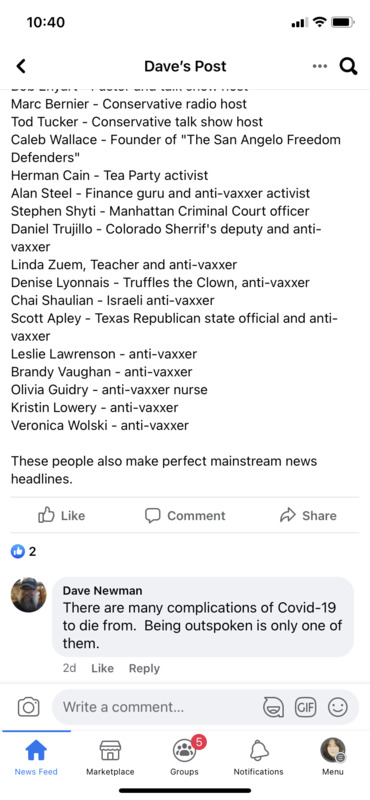
2021-09-22
A friend shared this public Facebook post with me. An anti-vaxxer theorizes about a conspiracy (by whom it’s unclear) to “kill” anti-vaxxers and anti-maskers WITH COVID because so many anti-vaxxers and anti-maskers have died of COVID. My mind is blown that they wouldn’t consider the possibility that their inability to protect themselves and others from the virus has made them particularly vulnerable.
-
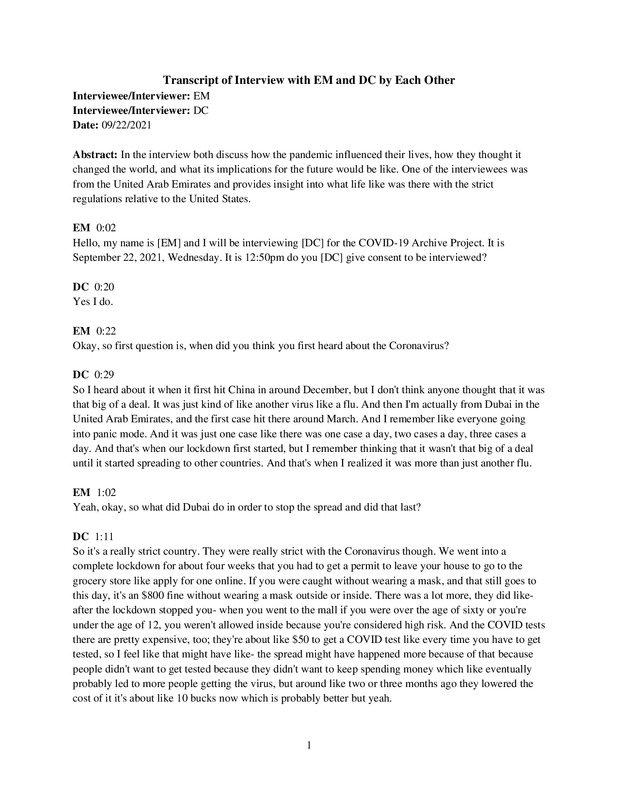
2021-09-22
It is important to strengthen the amount of first hand accounts of the pandemics for future reference and historical purposes.
-
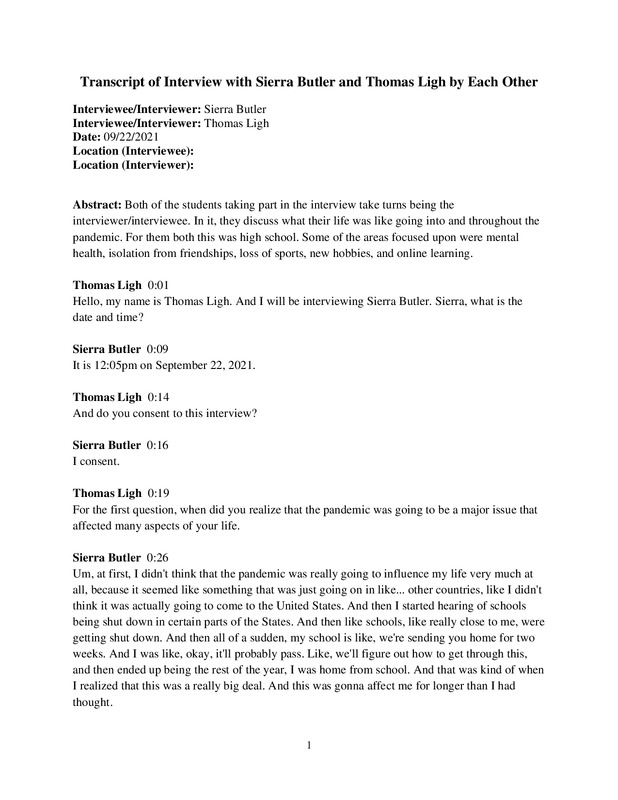
2021-09-22
Interview between two first year college students who have felt the effects of COVID-19 in their every day lives, with a focus on how it has affected their learning experiences in school.
-

2021-09-24
Shared in Facebook by Tsuutina Comm. The poster is directed at indigenous people in the Canadian Province of Alberta. It advertises three days of events (24-26 September 2021) that those who get vaccinated at the event will also receive a swag bag; that there will be draws for gift cards, Macbooks, and iPads; social media influencers present; live music; drive-in-movies; and food.
-

2021-07
Going into the weekend of the fourth of July; my roommates and I were notified of our exposure to covid-19. It came as a shock to us as for the most part we had been good at keeping away from situations that would expose us. After some deducing of how we were exposed we came to find out that one of our roommate’s girlfriend was our source. We decided to go and get tested in order to make sure we could participate in whatever fourth of July events we had scheduled. With the four of us packed into a car, we drove down to the nearest testing center. After waiting for what seemed like hours, we were able to get tests. What seemed like it would be a miserable experience of having something shoved up our noses turned out to be alright. A few days later we received calls informing us of our results. My test came back positive along with three of my roommates. However, hours later I was informed that my test was actually inconclusive and I should come get retested. So the next day I got up and drove myself over to the testing center. After waiting for an hour I was informed that I actually could not get tested for another 10 days due to my recent test. With this knowledge I had the pleasure of waiting out the week in quarantine, unsure of my exposure. The days went by long and slow stuck in a white room for 23 of the 24 hours in a day. My only real entertainment for the days being my PlayStation and my computer, and my only food being the simple groceries delivered to my house via amazon. Mostly peanut butter and jelly. After my 7 days were up I would drive to the nearest testing location to get tested. Except, that location was out of tests. I would spend the next 2 hours going to each location finding out the same thing, they were out of tests. The next 5 days would be spent doing much the same. Eventually, I would find a location and receive my test. After 2 more days I would find out my results: Negative. Having already spent more than my required quarantine time I would not know if I truly was positive in the early days. However, I don’t regret the time spent in self-quarantine in order to potentially protect others.
-
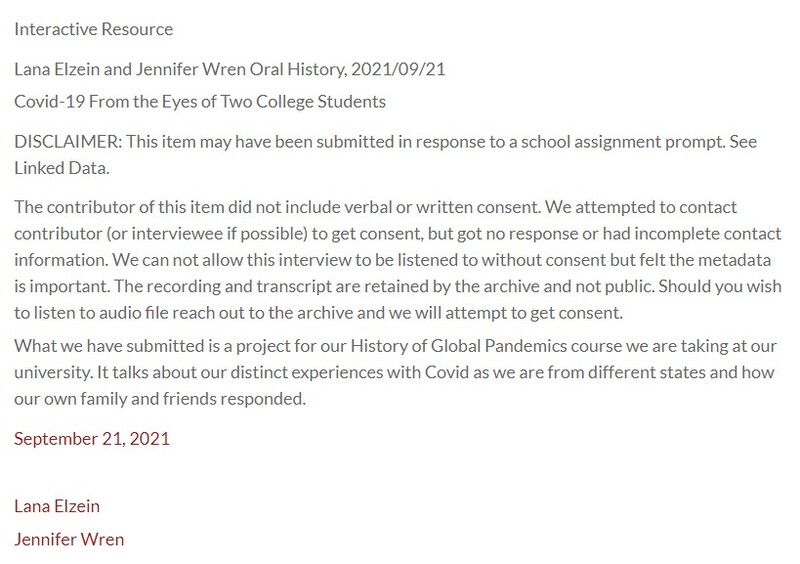
2021-09-21
The contributor of this item did not include verbal or written consent. We attempted to contact contributor (or interviewee if possible) to get consent, but got no response or had incomplete contact information. We can not allow this interview to be listened to without consent but felt the metadata is important. The recording and transcript are retained by the archive and not public. Should you wish to listen to audio file reach out to the archive and we will attempt to get consent.
-
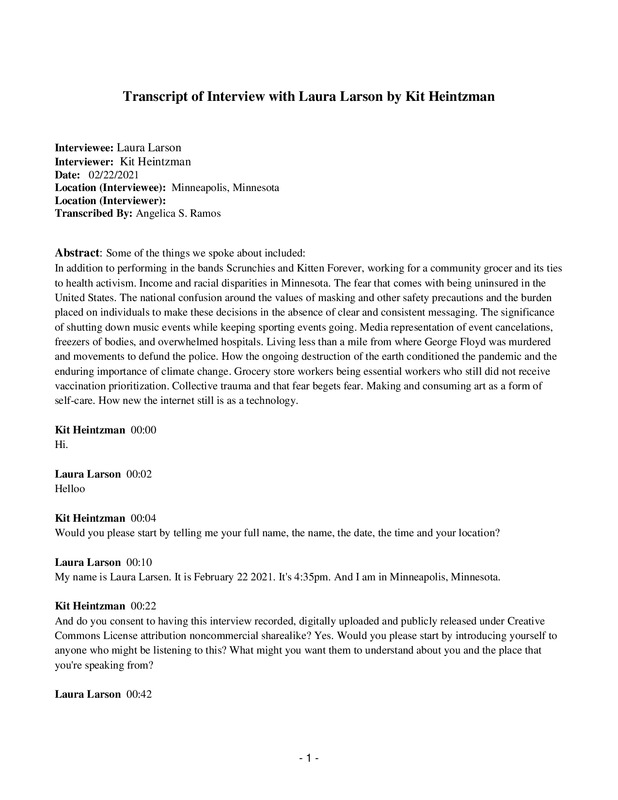
2021-02-21
Self description: “My name is Laura, and I am in two bands right now. I am in a band called Scrunchies and a band called Kitten Forever. I play guitar, base, drums, and I sing in those two bands. I live in Minneapolis, Minnesota. For work, I work at a community cooperative grocery store, in an administrative position, but one that is community outreach based and have a lot to do with meeting and coordinating with our community partners, a lot of the work that I do is about mutual aid, and helping out the community with the resources that we have available to us. Besides that I am a visual artist, I like to paint, I like to draw, I like to read books, and I live in a little duplex with my partner and our cat Sissy.”
Some of the things we spoke about included:
- In addition to performing in the bands Scrunchies and Kitten Forever, working for a community grocer and its ties to health activism.
- Income and racial disparities in Minnesota.
- The fear that comes with being uninsured in the United States.
- The national confusion around the values of masking and other safety precautions and the burden placed on individuals to make these decisions in the absence of clear and consistent messaging.
- The significance of shutting down music events while keeping sporting events going.
- Media representation of event cancelations, freezers of bodies, and overwhelmed hospitals.
- Living less than a mile from where George Floyd was murdered and movements to defund the police.
- How the ongoing destruction of the earth conditioned the pandemic and the enduring importance of climate change.
- Grocery store workers being essential workers who still did not receive vaccination prioritization.
- Collective trauma and that fear begets fear.
- Making and consuming art as a form of self-care.
- How new the internet still is as a technology.
Cultural references: Save Our Stages, The Atlantic article “Cancel Everything”.
See also:
https://scrunchies.bandcamp.com/
https://kittenforever.bandcamp.com
-
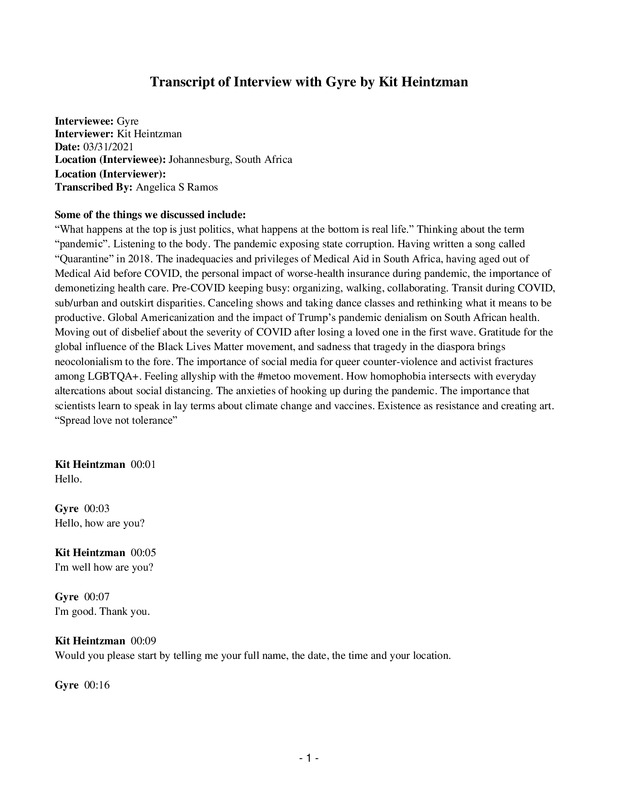
2021-03-31
Self-Description: “My name is Gyre. I am a multidisciplinary artist based in South Africa with global ambitions. I specialize in music, but I also work as a freelance writer as well as in dance. I’m a dancer learning to choreograph. Political commentator, particularity with regard to the LBGTQA+ community. I identify as queer. I am homoromatic and homosexual at this point in my life. You never know honey, it’s a spectrum. I had my first venture into artistic expression that is rooted in queer rights and queer understanding and queer theory, was my debut album, titled Queernomics, which was a documented audio-visual book about the contemporary experiences of a Black queer South African male, and that has gotten me into the positions that I express myself in, both out of passion and out of profession. Inkosi Yenkonkoni, which means “The Gay King”, in my native language which is Zulu.”
Other details available here:
Works produced during the pandemic: Kithi, International LGBTQ+ Rights Festival, writing on football.
Some of the things we spoke about included:
“What happens at the top is just politics, what happens at the bottom is real life.”
Thinking about the term “pandemic”
Listening to the body
The pandemic exposing state corruption
Having written a song called “Quarantine” in 2018
The inadequacies and privileges of Medical Aid in South Africa, having aged out of Medical Aid before COVID, the personal impact of worse-health insurance during pandemic, the importance of demonetizing health care
Pre-COVID keeping busy: organizing, walking, collaborating
Transit during COVID, sub/urban and outskirt disparities
Canceling shows and taking dance classes and rethinking what it means to be productive
Global Americanization and the impact of Trump’s pandemic denialism on South African health
Moving out of disbelief about the severity of COVID after losing a loved one in the first wave
Gratitude for the global influence of the Black Lives Matter movement, and sadness that tragedy in the diaspora brings neocolonialism to the fore
The importance of social media for queer counter-violence and activist fractures among LGBTQA+
Feeling allyship with the #metoo movement
How homophobia intersects with everyday altercations about social distancing
The anxieties of hooking up during the pandemic
The importance that scientists learn to speak in lay terms about climate change and vaccines
Existence as resistance and creating art
“Spread love not tolerance”
Other cultural references include: Trans Day of Visibility, astrology, and the TV series Pose.
-

2021-09-21
In March of 2020, I was sent home from Duquesne University due to the rising COVID-19 pandemic. At the time, I did not grasp the magnitude of the situation, but I quickly realized that the next year and a half were going to be rough. As soon as I got home, signed up for Door Dash to maintain steady income while most places were either closed or under heavy regulations. Personally, I was not concerned about contracting the virus myself, rather bring the virus home to my family. My sister worked on a COVID floor in a hospital, and I was working everyday around people as well. We were very cautious because my mother is immunocompromised, meaning her immune system is weaker than normal. If I were to bring the virus home to her, or anyone in my family, I would have felt terrible, so I was very cautious when I was working for Door Dash. I wore my mask everywhere I went, inside restaurant, outside while delivering food, everywhere.
Also, during this time, I had to take care of my grandmother and great aunt as well. Both of them live very close to where I live, so I had to deliver groceries and medicine to them for a year and a half. That part was the most concerning. With both of them being over the age 65, being cautious was an understatement. After about a year od delivering food and such to them, the moment the vaccine was available, my family took the opportunity. I was the last to get the vaccine, as I was more worried about my family rather than myself.
Living during COVID was not easy. The constant worry on if I had the virus if I had a slight cough or a sore throat was tiring. Constant stress was hanging over me and on top of that, school was not easy either. Online classes were tough, as I am very much an in-person learner, but at the end of the day, my family is all healthy and I am as well. COVID-19 was a challenge but being able to overcome those times was incredibly relieving.
-
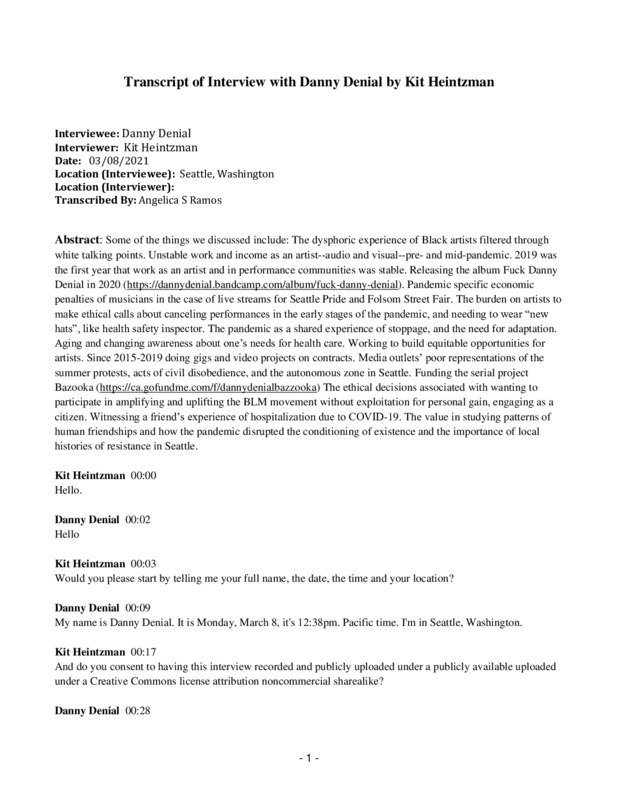
2021-03-08T12:38
Self-description: “Audio visual artist that lives in Seattle, Washington, specifically in the realm of music and film, and also the intersection of the two. A lot of my work involves amplifying experiences and voices that are often underrepresented, primarily in the Black and LBGTQ+ community. And that’s something that overtime my work has been diving deeper and deeper into over the years, which is something that I think as an artist, I’ve only really come to terms with in the last few years. But it’s been definitely both empowering for me and illuminating to see it reflected back in the ways that people have responded to the work.” Other biographical details: late 20s, from Los Angeles.
Some of the things we discussed include:
The dysphoric experience of Black artists filtered through white talking points.
Unstable work and income as an artist--audio and visual--pre- and mid-pandemic. 2019 was the first year that work as an artist and in performance communities was stable. Releasing the album Fuck Danny Denial in 2020 (https://dannydenial.bandcamp.com/album/fuck-danny-denial).
Pandemic specific economic penalties of musicians in the case of live streams for Seattle Pride and Folsom Street Fair.
The burden on artists to make ethical calls about canceling performances in the early stages of the pandemic, and needing to wear “new hats”, like health safety inspector.
The pandemic as a shared experience of stoppage, and the need for adaptation.
Aging and changing awareness about one’s needs for health care.
Working to build equitable opportunities for artists. Since 2015-2019 doing gigs and video projects on contracts.
Media outlets’ poor representations of the summer protests, acts of civil disobedience, and the autonomous zone in Seattle.
Funding the serial project Bazooka (http://web.archive.org/web/20210622155802/https://ca.gofundme.com/f/dannydenialbazzooka)
The ethical decisions associated with wanting to participate in amplifying and uplifting the BLM movement without exploitation for personal gain, engaging as a citizen.
Witnessing a friend’s experience of hospitalization due to COVID-19.
The value in studying patterns of human friendships and how the pandemic disrupted the conditioning of existence and the importance of local histories of resistance in Seattle.
Cultural references: Pan’s Labyrinth, Smash Mouth’s super spreader event, Portland International Film Festival, The Tape Deck Podcast, Punk Black, Darksmith, Taco Cat, Alice and Chains, Duff McKagan, Pearl Jam, MoPOP, Shaina Shepherd, and TheBlackTones.
-
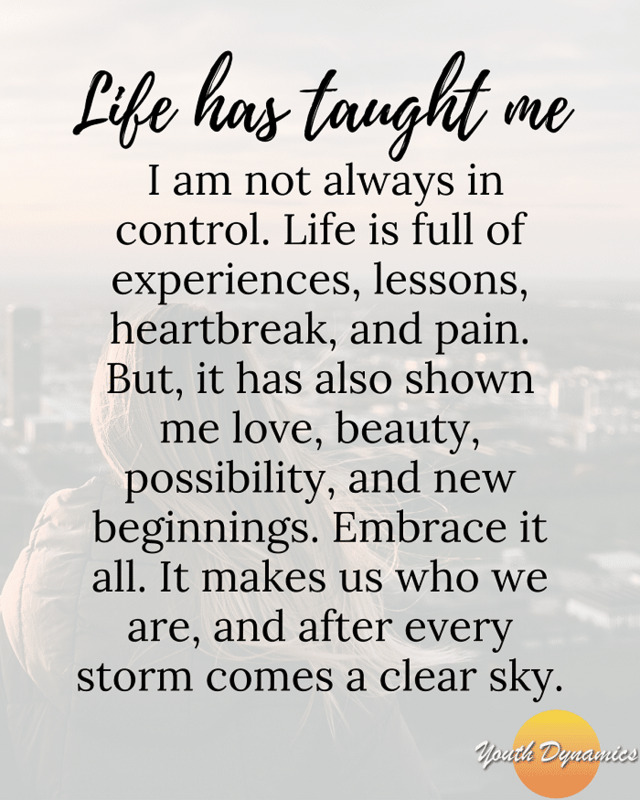
2020
Throughout the pandemic, my parents tried to navigate the line between being flexible yet cautious. They did their best to keep my siblings and I safe while also trying to understand and accommodate our needs as young adults to connect with our peers. It was important that they balanced the health and well-being of not only our immediate family but our extended family as well. For as long as I can remember, my family has spent every holiday, birthday, and any other major or minor event with my grandparents, aunts, uncles, and cousins. My family, as well as my dad’s side of the family, are all local to Pittsburgh, so I have been lucky enough to grow up with them. My dad is one of five and all together there is fourteen of us grandchildren. In January of 2020, right before covid had started, our grandmother passed away from pancreatic cancer. This was a very hard time for my family as we were all incredibly close to her. However, as I look back, I am almost grateful that she is at peace and did not have to experience the crazy covid world in which we are currently living in. My uncle also had pancreatic cancer and had been living with it since his diagnosis in 2012. Our family did everything we could to get him the best treatment and keep him as healthy as possible. Covid made it extremely difficult to be with my family and it was something that I was not used to as I spend much of my time with them. However, our uncle was always our number one thought through it all as he was very at risk due to his underlying health conditions. Months and months went by without seeing my family and we had to continue to cancel get togethers due to my family members health concerns. Not seeing my family frequently was a struggle as I felt disconnected from them and events happening in their lives. My uncle began to fall very ill in September of 2020 and I felt that I was unaware of the extent of his illness. The disconnect and miscommunication from quarantine and covid made it very difficult to get through his time of sickness. Unfortunately, my uncle had passed away shortly after falling ill. It was difficult to think of all of the time we as a family could’ve spent together over the course of the pandemic and all of the memories we could have been making with our uncle before he passed. The pandemic had negatively affected many aspects of life in general but losing a loved one in addition is indescribable. As horrible as the pandemic has been, it has taught me many important lessons in life. I have always loved and appreciated my family but the events that occurred during the pandemic had only brought me closer to them and made us stronger in the end.
-
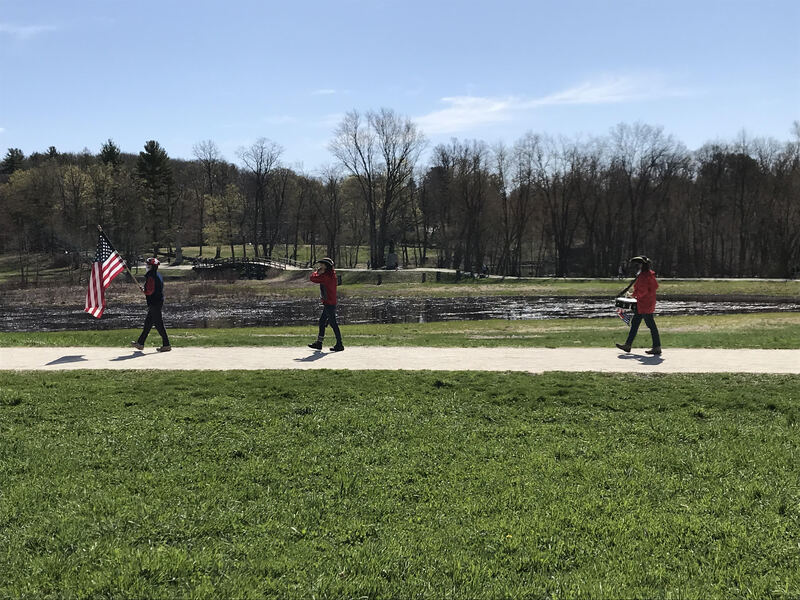
2021-04-19
Three sisters raised in Concord, MA take up the American flag, fife, and drum and march up to Old North Bridge and subsequently through Concord Center to commemorate Patriots Day in Concord, MA, one of the battle sites in the Battle of Lexington and Concord that sparked the American Revolution. Due to COVID-19, the famed Patriots Day Parade in Concord has been cancelled in both 2020 and 2021, and the Concord Minutemen--mainstays for the parade's performers--have been unable to play for the holiday. These three sisters, during both 2020 and 2021, took initiative to keep the long-standing tradition alive for the town and others who are typically attracted to Concord on this historical day. One of the sisters, the fifer, is a member of the Concord Minutemen.
-
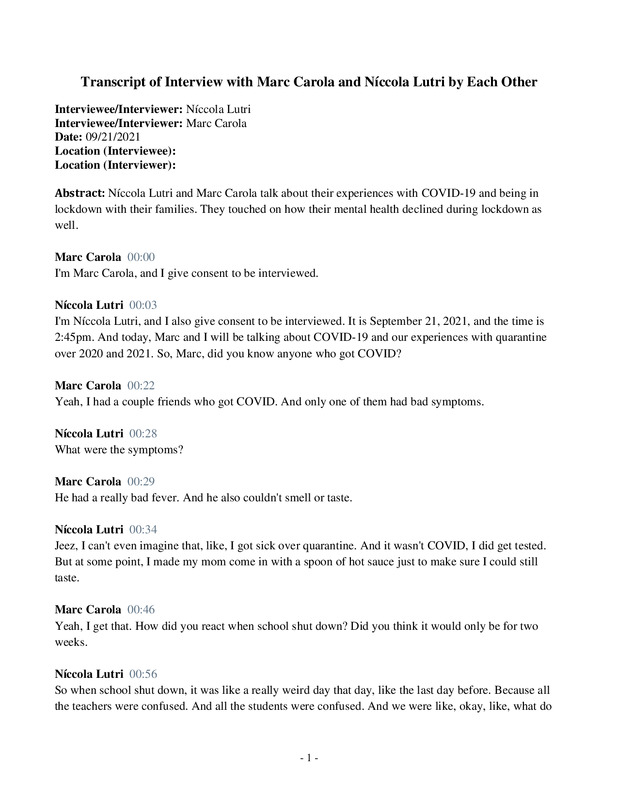
2021-09-21
Marc and Níccola talk about their personal experiences win COVID-19 and quarantine discussing family, mental health, and personal anecdotes.
-
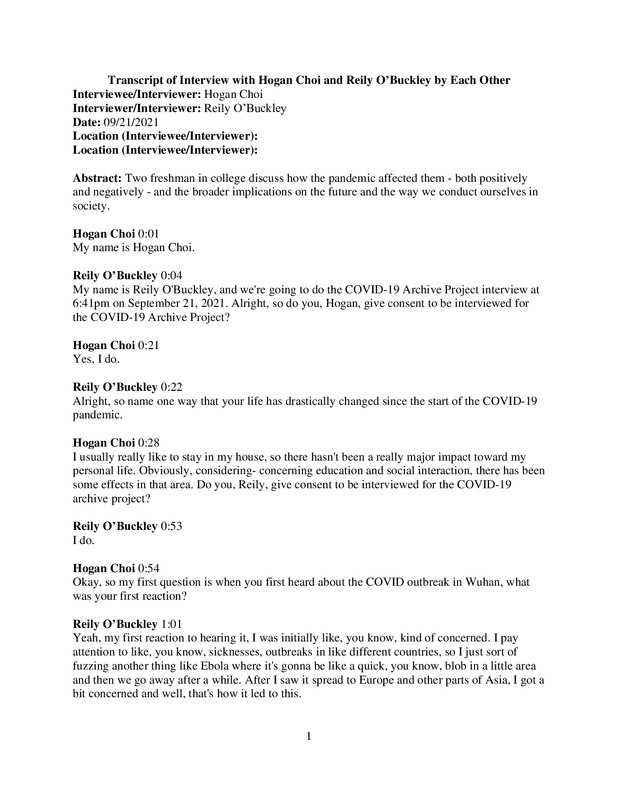
2021-09-21
This is an interview between two Northeastern University students on how Covid-19 that shared their thoughts about the impact of Covid 19 both personally and globally.
-
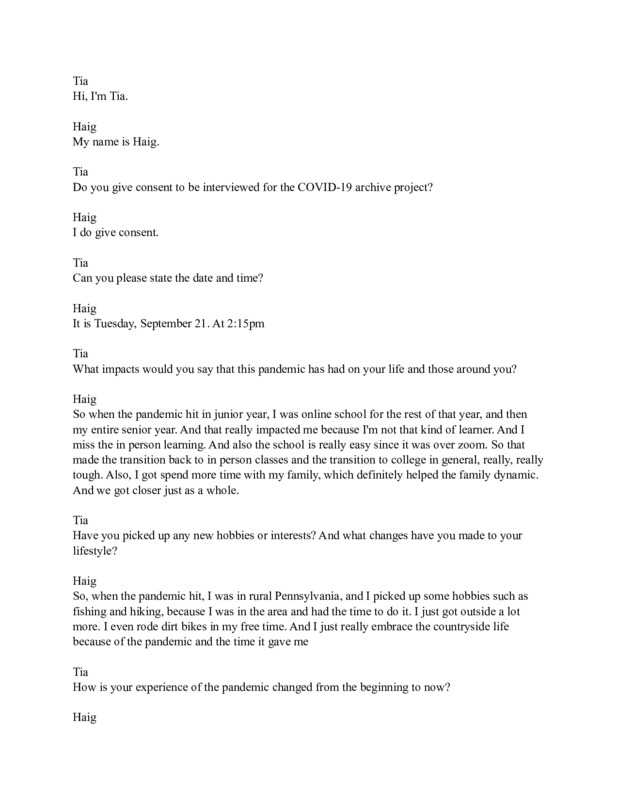
2021-09-21
I think it's really important to document everyday life during the pandemic because soon everyone will forget what it was like.
-
2020-08-27
During the Covid-19 pandemic, many lives were lost and changed forever. I was one of the lucky ones where myself and no one I knew was affected. One thing problem that surfaced to me during the pandemic is the online schooling. My fall semester of 2020 at Duquesne University was all online and it was a struggle being in my house just outside of Pittsburgh. Professors and faculty did their best to learn the technology and to teach the students through online interactions. I truly give them all the credit in the world for that, but it is extremely tough to learn. There is no clear-cut communication between students and their professors. Usually, you are able to form some sort of relationship with the professor, but there was not an easy way to do it. It was also hard to form a relationship with your classmates. You only knew the people that you knew before the pandemic. With no relationships in the class, it felt a lot harder. There was no one really to help you or just discuss the class with. People rely on people and in the online world, it is hard to have that connection. Our world cannot stay online. People need to be in offices and in schools working with one another. The online world is a way to hide from doing work where we need to be face to face. People need people. Our world depends on each other and the online world is a great thing, but it cannot be implemented for schooling.
It was very hard for me to learn online because I was distracted by all the things at my house. What would you rather do, listen to an hour lecture or watch a tv show? It was hard to stay focused on schooling because it did not feel like school. I blame myself for not being able to pay attention during the classes, but if I struggled with it, I know many other kids did too. While taking 5 courses online, I have to be honest in saying I do not know if I really learned anything. I am thankful that I was not online too long.
-
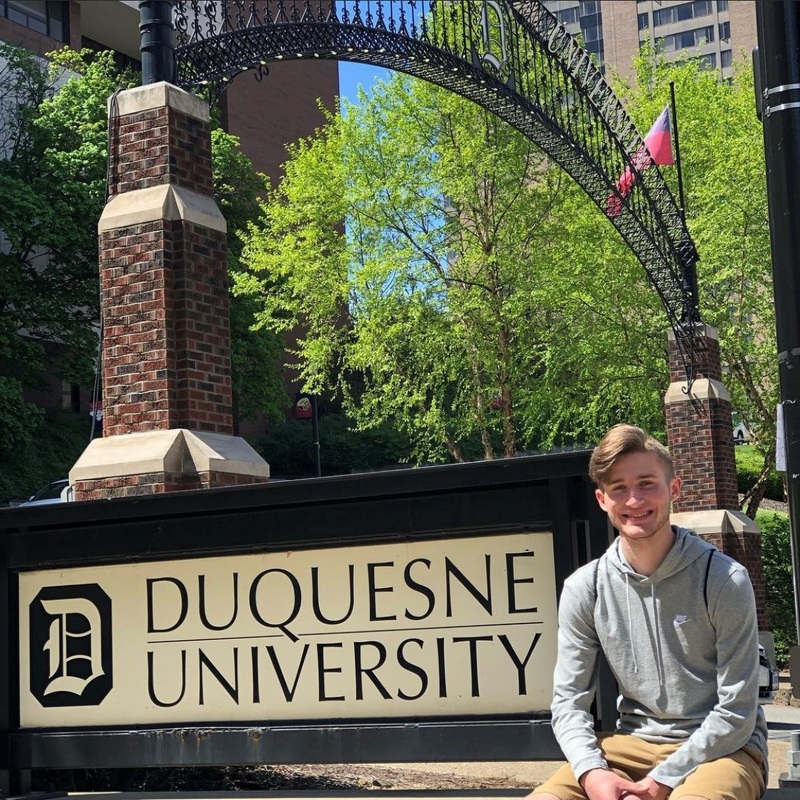
2020-03
The COVID-19 pandemic has affected so many people all across the globe in many different ways. One of the big groups of people that have been affected in the United States is college students. I was a semester and a half into my freshman year here at Duquesne when everything began to take a turn for the worse. Looking back to then, I was still finding my way and learning what it was like to be a college student at the time, just beginning to become familiar with the lifestyle. The past year and a half as a college student has been a long and hard process of transitioning into life as a college student during a global pandemic. Simple things like going to class in person, to eating with my friends in the dining hall were not as simple as they once seemed. Many students, like myself, struggled with being as involved in online classes like we were during in person classes. Along with that, I struggled with retaining a lot of the information given to me by my professors during class time, communication between student and professor was not as easy as it used to be. But not only has the education aspect of college changed drastically, there has been a huge change in the social aspect of college as well. Simple things like meeting with some friends to go get dinner after a long week of classes was not as easy as it once was. Looking back, freshman year now feels like an eternity ago, a lot about my life as a college student has changed due to this pandemic. Certainly, things are becoming better, and we are getting closer to normality, but the pandemic still affects me as a college student till this day. Still having to wear masks on campus as well as getting a COVID test when feeling a little bit sick are some things I have had to deal with recently. Life as a college student is ever changing during the pandemic, it has been very hard at times, but it is certainly something I will never forget.
-
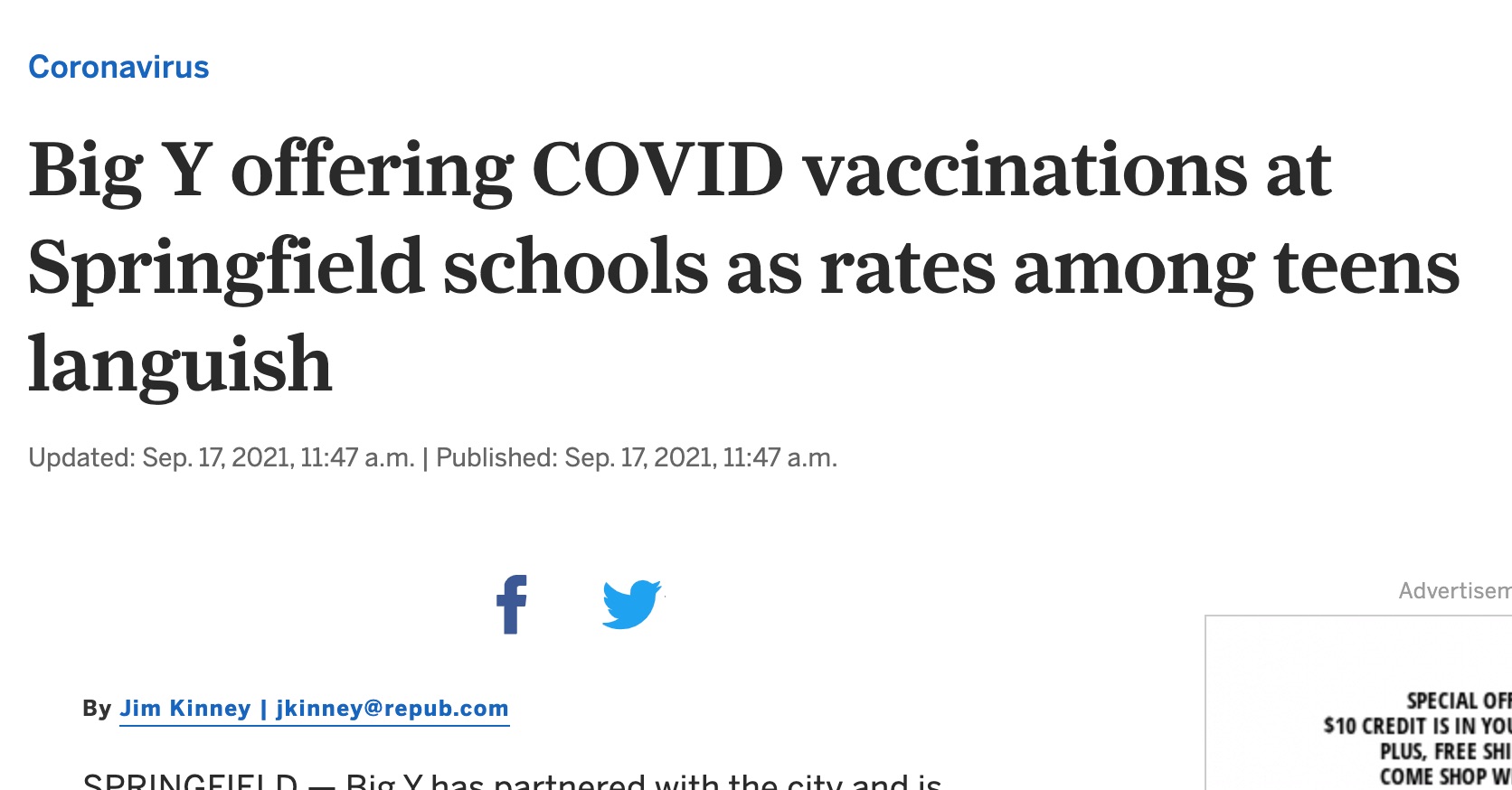
2021-09-17
This MassLive article reports on the efforts of Big Y, a local grocery store chain in Massachusetts and Connecticut, to offer vaccinations to high school and middle school students in Springfield, Massachusetts.
-
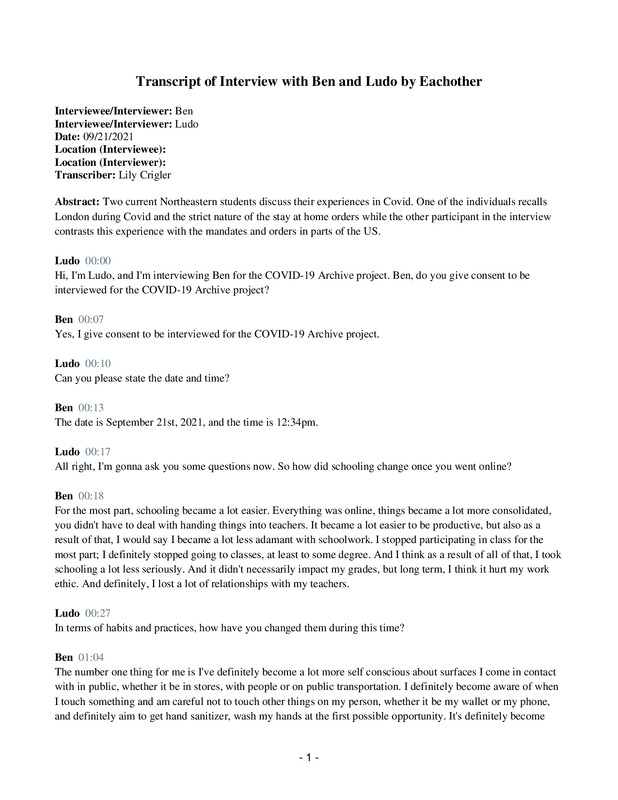
2021-09-21
We completed this interview for our History of Global Pandemics class, which we take at Northeastern University.
-
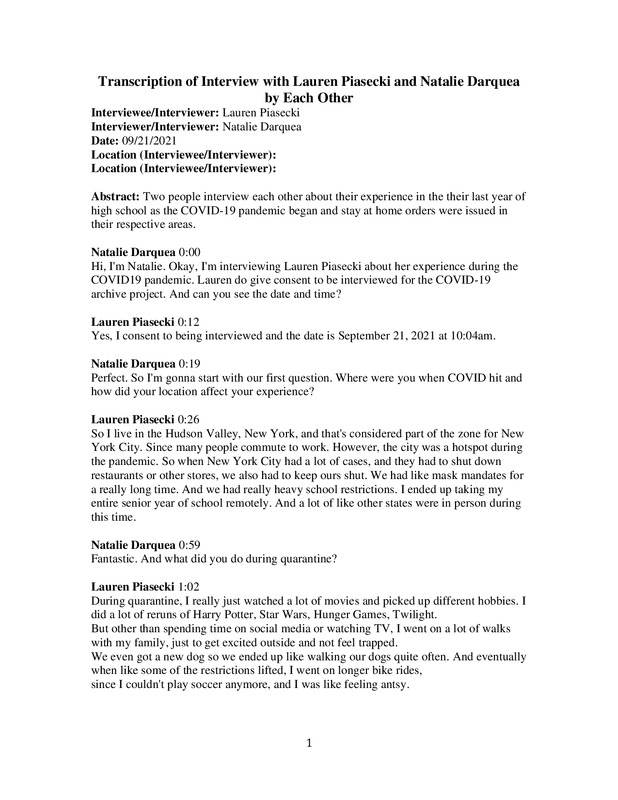
2021-09-21
Covid-19 experience at high school students in the US.
-

2020-04-01
When the pandemic hit, our whole way of life completely changed. One day I was at college constantly around all of my friends and all different types of people. The next day, I was back in my house and trapped there. At first it felt nice to be home for a change after spending a lot of time away from my hometown. Then a couple of weeks passed, and the isolation started to kick in. It was only my mother and I for that 3-month complete lockdown but looking back at it now, I would not have wanted it to be with anyone else. With that being said, we drove each other absolutely crazy. I know that she was happy at first since I am far away at school, but I know as we got deeper and deeper into isolation, that we were getting very annoyed at each other. It was a rough situation we were in during that time. She was very busy with her job working remotely and I was getting adjusted to zoom school which was not a good time. We were both stressed from the work we had to do and the fear of not knowing when we would be able to leave our house and be with other people. We then reached a boiling point and had a screaming match at each other. At this point, I truly do not remember what we were actually yelling at each other about. But we both recognized that we were both just going crazy from being in our house all of the time. We had our anxieties about the virus which did not help our mental states. Our regular life stopped for a long time, and it took a toll on us with the huge change. But we stayed strong and thankfully made it through and we are slowly getting back to regular.
-
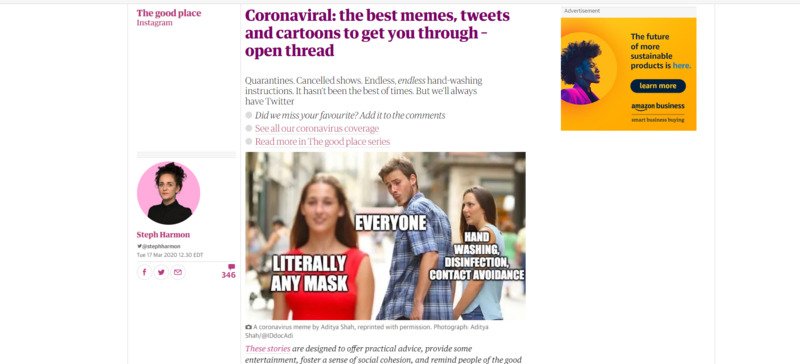
2021-08
My story tells how seriously some people took the pandemic. Some people were very scared and took extreme measures to stay safe while others took the pandemic seriously, but didn't really take extreme measures to stay safe.
-
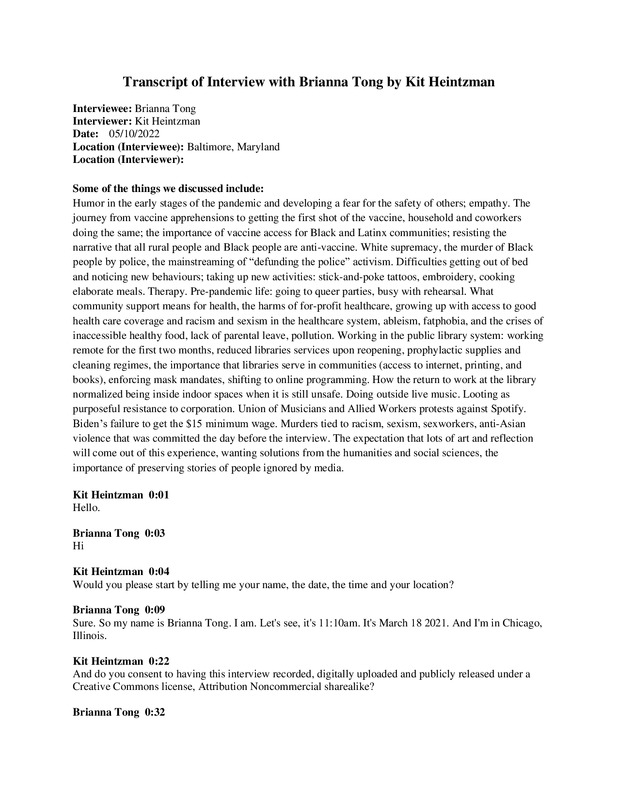
2021-03-18
Self description: “I am sitting in my bed right now as I’ve done for a lot of this quarantine. In regular times and I guess still now, I’m in three bands and I also work at the library, the public library. So I’ve been working there in person since we came back to work in May. I was contacted for this interview through Bussy Kween Power Trip, which is a Black queer punk band with three people, no guitars, so my close friends. I’m in two other bands. One band is called Je’raf and one is called Cordoba. And one person each from Bussy Kween is in each of those bands. Haven’t played a show in forever. I can give a little about what I look like or am like. I’m a woman. I’m 26, almost 27 I guess. I’m Black and Asian. I’m kinda short. And during this pandemic I’ve been in general super lucky to have a job still and a great living situation. And I met my partner right before the pandemic, so we’ve been chilling a lot and that’s been amazing. She is so great. Yeah, just going to work and working on all kinds of things in my home. And sometimes having the energy to do a bunch of music and crafts and other art things, and sometimes laying in bed for a full day.”
-

2021-09-09
Here in Victoria Australia, our pandemic experience has been easier than most. We live in a regional area and we have not had the angst of the long ongoing harsh lockdowns experienced by Metropolitan Melbourne . However going in and out of lockdown, hearing about growing exposure sites and increasing Delta virus numbers is disturbing and anxious making. The one constancy in our lockdown lives, is Pip the Whippet. Walking, sleeping, eating and loving is all she does. In lockdown her daily taste was to go into the local cafe and bring cheer to the Barista while my husband waited to pick up our takeaway coffees. Attached is a picture of Pip the Whippet waiting for our take away coffees. She has been a ray of sunshine in our lives at this point in time, and wearing her hound tee has brought a smile to all, as we progress through this, the strangest of times.
-

2021-04-17
In February I registered for the 1st Minnesota living history event organized by the Liberty Rifles. The idea behind it was that we would create an interactive living history event in conjunction with the National Park Service for the public at the Gettysburg battlefield. At the time, I hadn't been apart of an authentic event before, nor had I been to Gettysburg, so I was really excited for the event. I spent something like $800 improving my impression and so that I could be sure I met the uniform standards and guidelines. Unfortunately, two months before the event the NPS canceled it over Covid concerns. Needless to say, everyone was pretty bummed about it, but the LR event organizers had a plan B event in mind, so a few days after the news of Gettysburg being canceled we were told about the Hell Spot at the Port Republic event, and that we were going to portray the 1st Virginia Infantry (US). Covid cancelled a lot of events in the hobby, and for most of 2020 nothing was happening, much to our dissapointment.
-
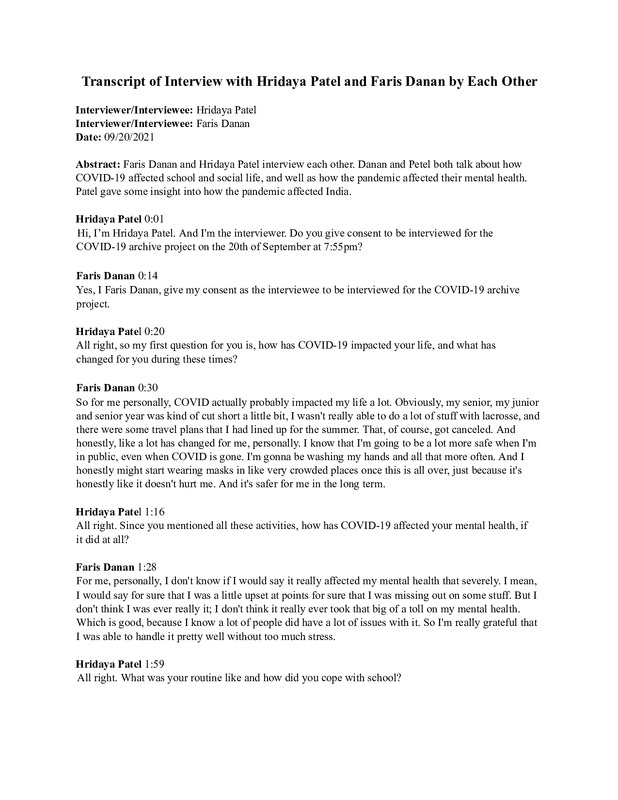
2021-09-20T19:35:00+00:00
This object shares both of our experiences with the COVID-19 pandemic
-
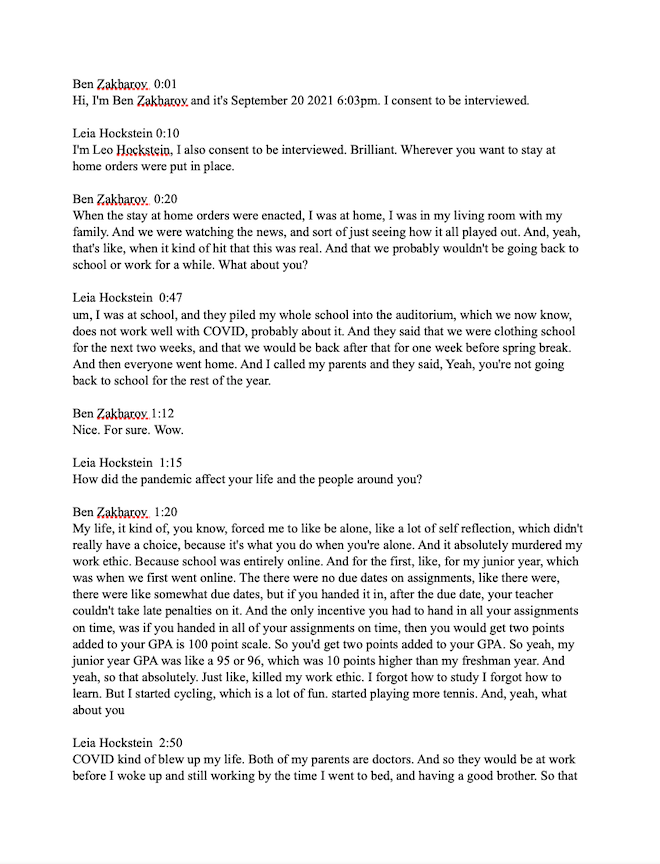
2021-09-20
Our interview tell our experiences with the pandemic both personally and in relation to our surroundings from the perspective of a high school senior.
-
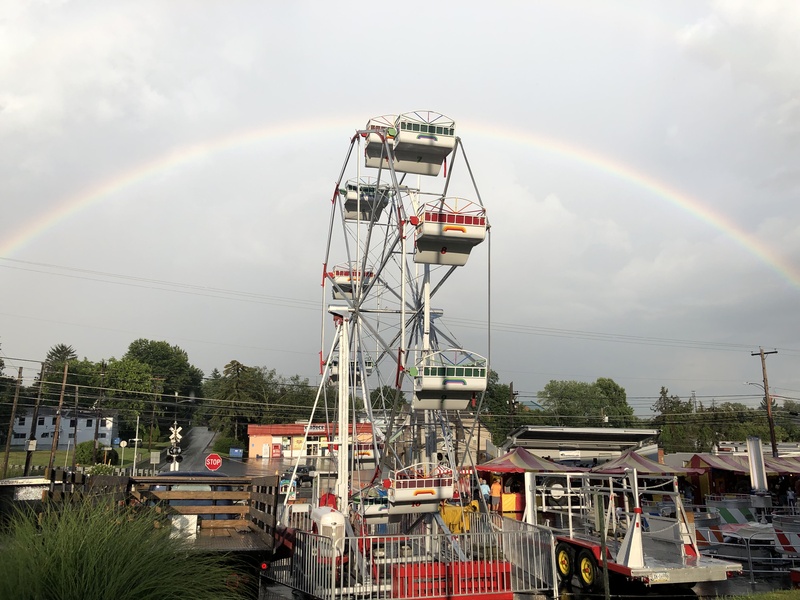
2021-09-20
I was nineteen years old, now soon too be twenty-one, when news started circulating about a new virus that was spreading around in China. Personally, I thought the whole thing was just a bunch of fear mongering being played up by the media for clicks. In March of 2020 my theory would turn out to be drastically wrong. Slowly the spread of this new virus became worse and worse and before I knew it, everything was shut down and my family was in lockdown. My in-person classes at Duquesne University were all cancelled and moved to online conference calls over Zoom. For the first time in my life, a global event was having a real, tangible effect on my life. Being born in December of 2000, I have already lived through some world events that will go down in history. Wars in the Middle East, the Housing Market Crash, 9/11, the rapid advancement of computers and technology… all things I was alive for but either to young to remember or to ignorant to see the significance. For the first time in my life, I was seeing a major occurrence in the world directly impact my life and was able to comprehend the seriousness and significance. The object I have loaded is a picture of the Ferris Wheel my family owns and potentially one of the last times I will ever have seen it up and running. Hundreds of thousands of small and family run businesses have either been shut down temporarily or shut down for good because of the pandemic, my family business is no exception. My family runs Reinhart Amusements, a business that provides rides and games to Parishes around the Pittsburgh, Pennsylvania area for their summer festivals. I’ve been working for the businesses since I was fourteen and started helping long before then. Like many others, we too had to shut down because of the pandemic. My family does not rely on this business financially like my grandfather did. For my parents and many in my large family, it is more of a self-fulfilling hobby. I’m very lucky to get to say that my father and his father have put smiles on the faces of kids and adults alike all around the Pittsburgh area. It is now September 20, 2021 and we have not been able to partake in a festival for over 2 years now. It is sad to say, but after talking with my father and if we are unable to open back up in 2022 then we never will. I don’t know what the future holds with this virus and the world. What I do know is that though the pandemic may take away my family business, it will never take away my own and many others happy memories of it.
-
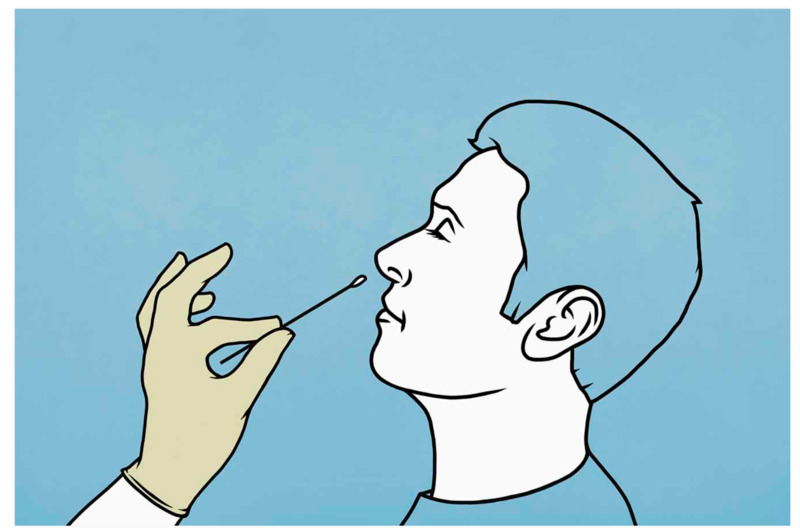
2021-09-20
I recently got a message from my best friend since middle school telling me that she had tested positive from Covid. She was vaccinated before I was and quarantined more vigilantly during the majority of 2020 than anyone else I knew. Delta variant breakthrough cases are less rare than people believe.
Part anecdote part advice The KHN article answers common questions about what to do if you become one of the breakthrough cases of Covid-19 and what this may mean long term.
-
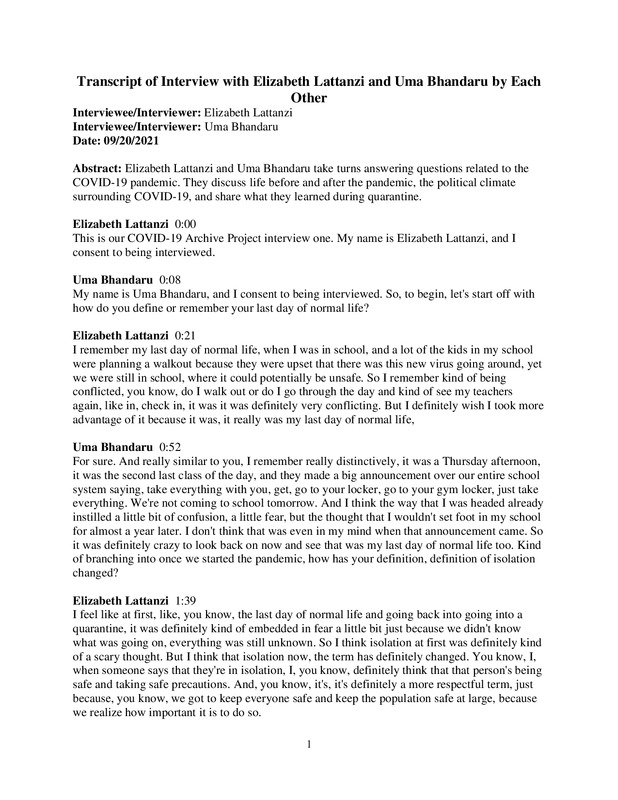
2021-09-20
-
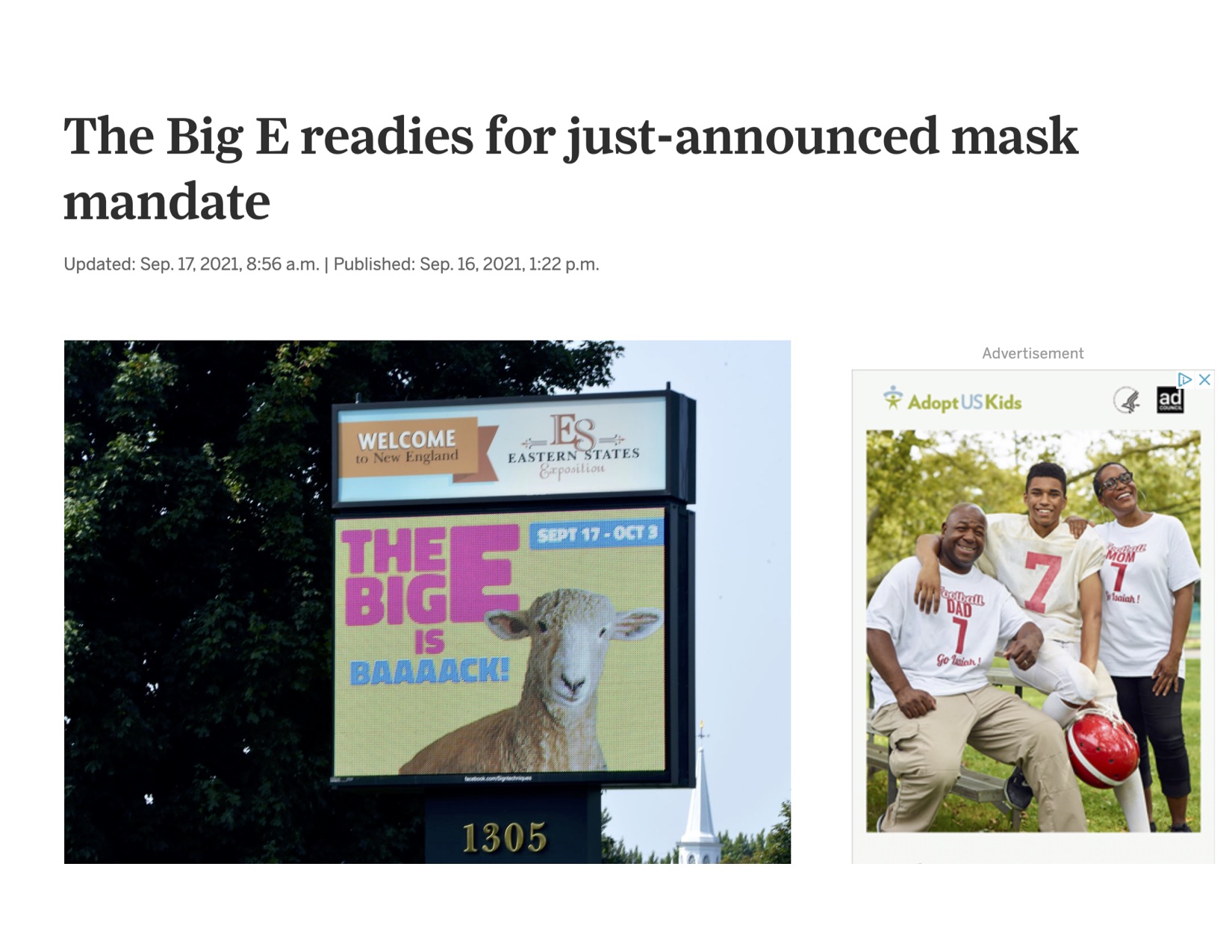
2021-09-17
This MassLive article reports on the Big E's reaction to the newly instated mask mandate in Massachusetts. The Big E, or the Eastern States Exposition, is a New England fair held in West Springfield, Massachusetts, annually. It was cancelled in 2020 due to the pandemic.
-
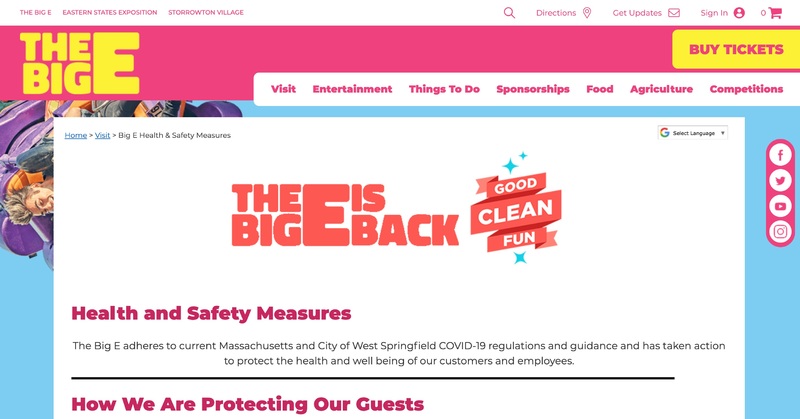
2021-09-20
This page on the Big E's website lists the health and safety measures put in place at the Big E, known formally as the Eastern States Exposition, which is a New England fair held annually in West Springfield, MA. The fair was cancelled in 2020 due to the pandemic, so it has a series of health and safety measures in place in attempt to make attendance safe in 2021.
-
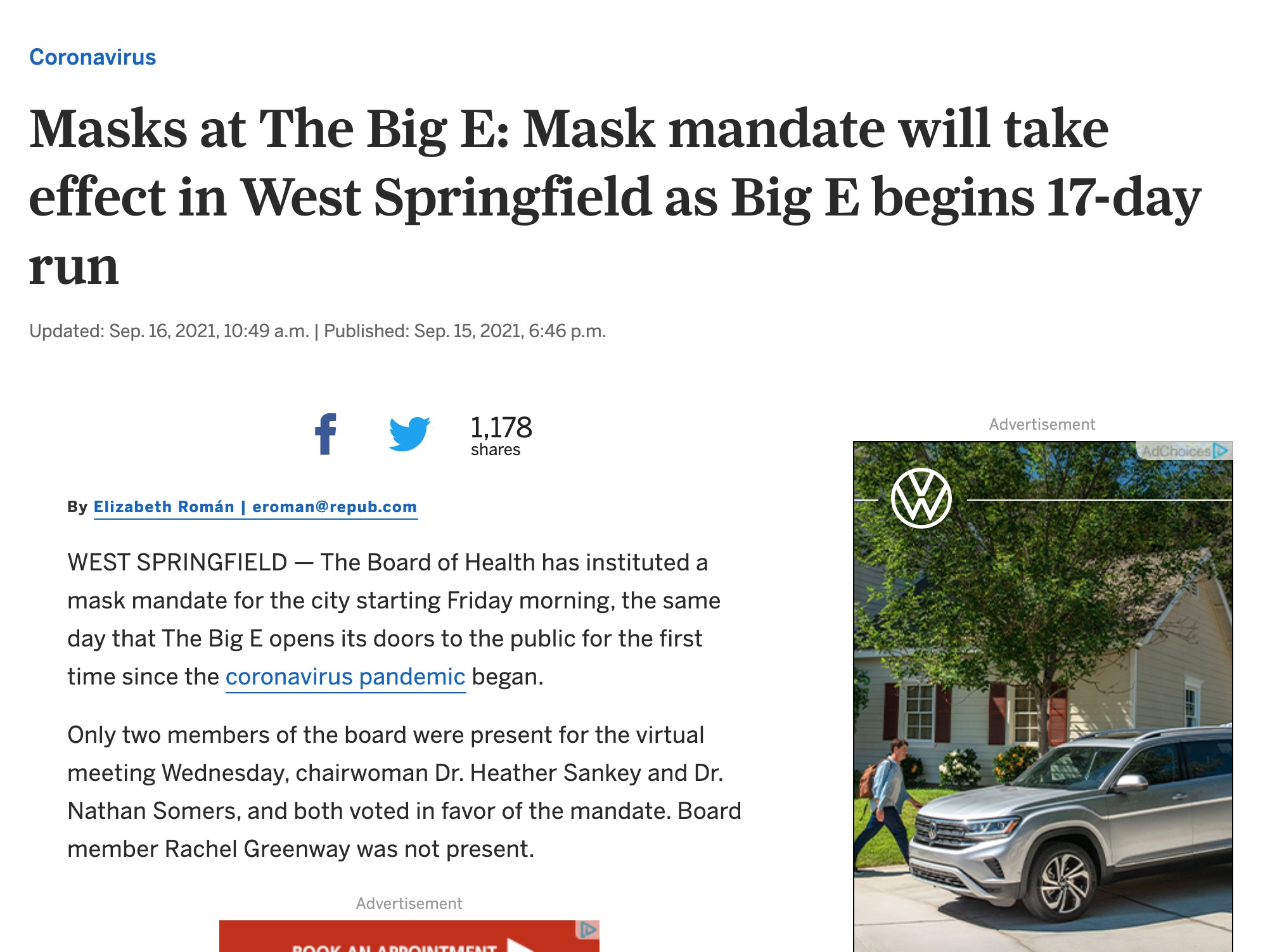
2021-09-16
This MassLive article reports on the Board of Health's decision to enact an indoor mask mandate, which will affect the Eastern States Exposition, or Big E, held annually in West Springfield, MA. The New England fair was cancelled in 2020 and is trying to make a comeback in 2021 despite the pandemic.
-
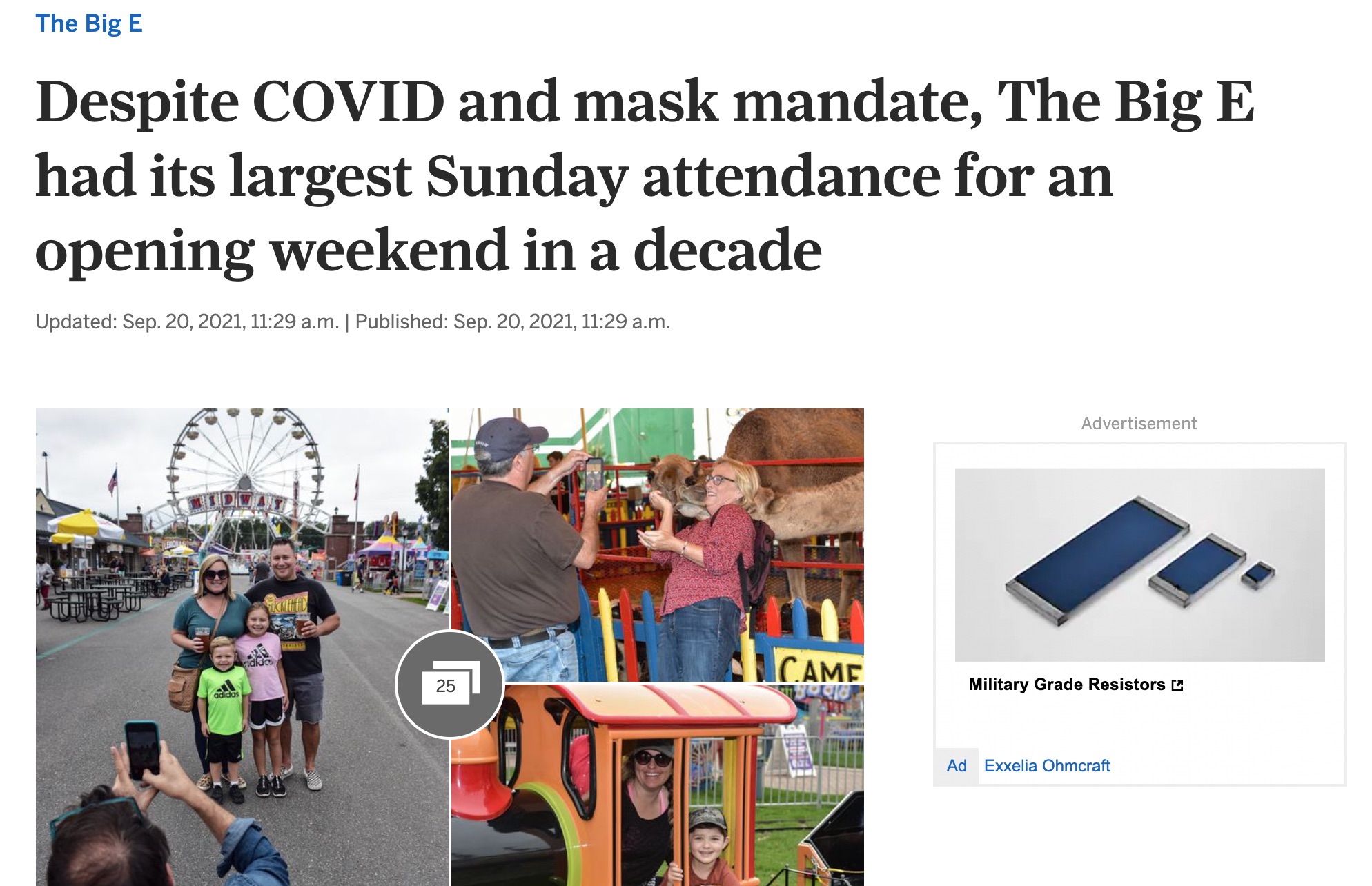
2021-09-20
This article reports on the crowds on the third day of the Eastern States Exposition. Commonly referred to as the Big E, the Eastern States Exposition is a New England fair held at the end of September in West Springfield, Massachusetts. It was cancelled in 2020 due to the pandemic, and town residents have concerns about the Big E in 2021.
-
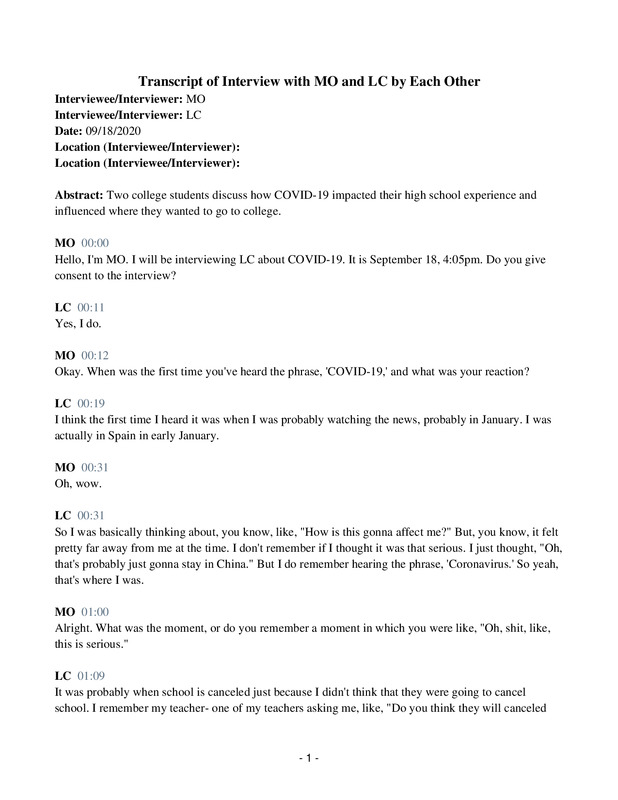
2020-09-18
Basic interviews between two college students looking back on the start of the pandemic.
-
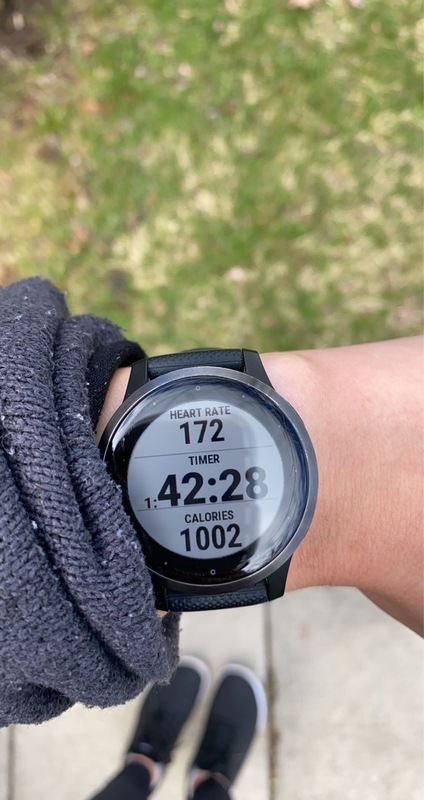
2020-03
The year 2020 was looking to be much like other years that I spent in college. I was going to be going to classes, meeting up with friends, and working out most days. As March approached, my excitement grew. Spring break was coming, and I had a scheduled trip to Cancun, Mexico. There was talk of a virus spreading through China, but it was very unknown to us. Prior to our trip, we joked about contracting the virus. Little did we know, that would be the week living in the world the way we knew it.
My trip to Mexico was everything I wanted it to be and more, but I was ready to come home and finish the semester. We came back from Mexico, and I returned to Duquesne. Within one week of my return, everything changed. Universities around the country started to close for, what we thought at the time, two weeks. Duquesne followed suit. School did not return that semester and the entire country began to shut down.
There was a lot of fear and unknown. One minute I was having the trip of a lifetime, and the next minute I was at home with my family only leaving to get groceries. We began using masks everywhere we went, using hand sanitizer many times a day, and staying as far away from others as possible. Although life felt like it completely stopping, the pandemic allowed my family and I to experience something that we might never get to experience again: over a month of quality time together. I was now doing school via zoom and my father, brother, and uncle were home from work.
During this time, my family spent a lot of time together. My father and I would find interesting ways to work out every day since our gym had been shut down (see artifact image for a picture of my watch after completing a weighted vest walk. We began these weighted vest walks during the pandemic.). We would watch Netflix series as a family, do puzzles, and even play board games together. I will never forget these memories, even though they were accompanied by fear of the Coronavirus.
-
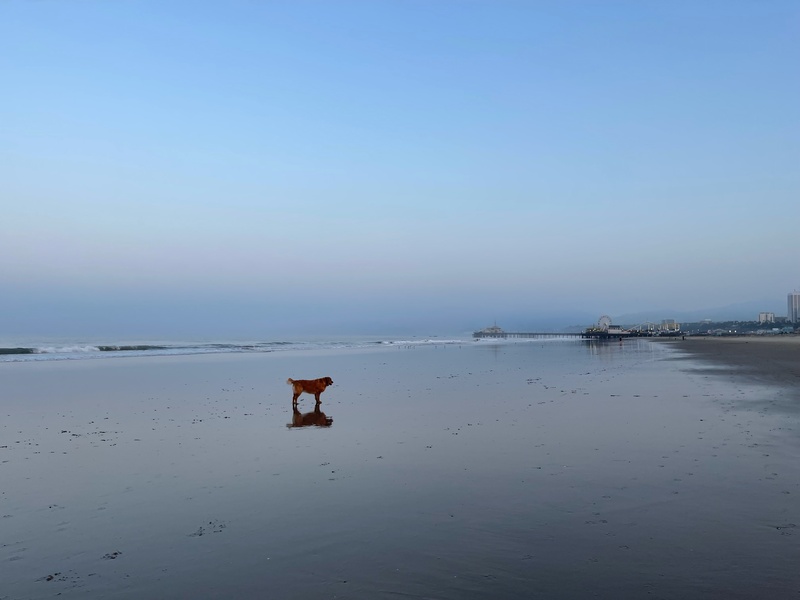
2021-08-15
For me, the pandemic brought a new found attention to the passing of time. My hope for a post-pandemic life is one where we continue to find time for the things we most appreciate and enjoy - like a walk on the beach at low tide.
-
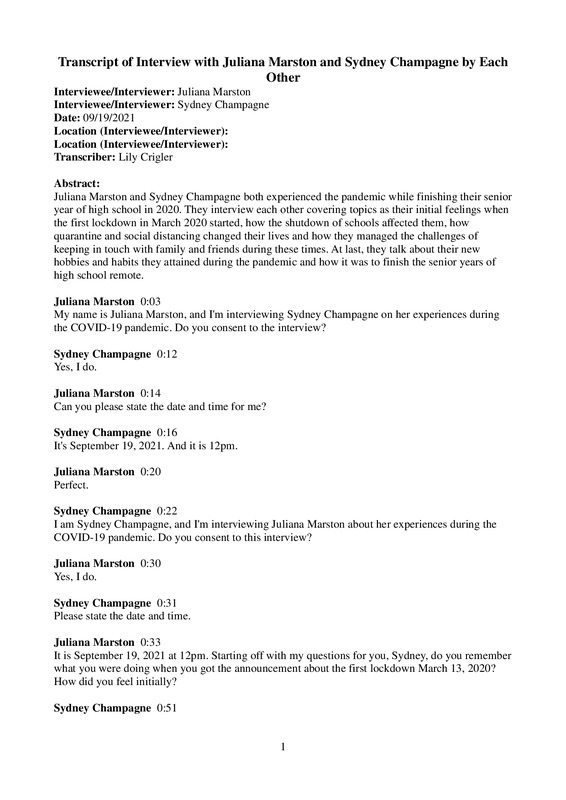
2021-09-19
This video interview discusses Sydney and I's respective experiences throughout the pandemic. It is important to me because the two of us realized (through the interview) that our experiences were more similar than we first thought.
-
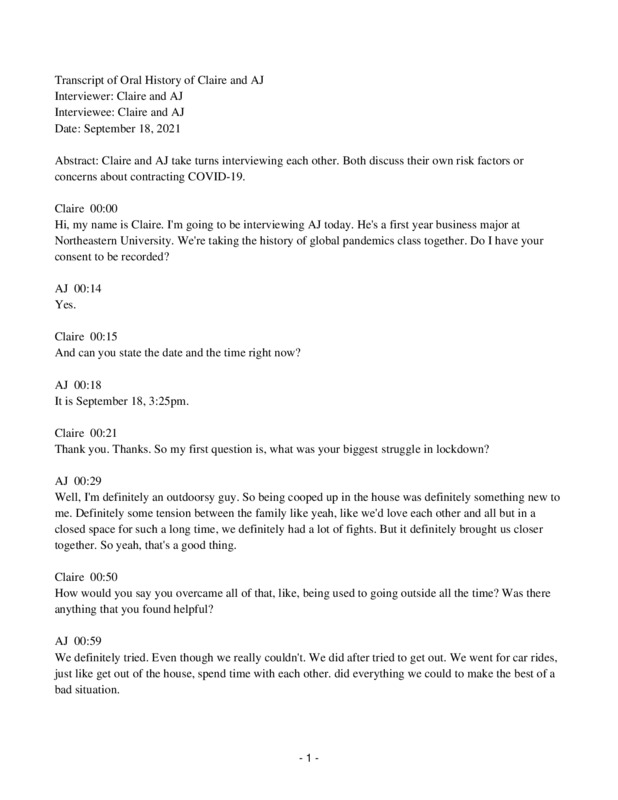
2021-09-18
Explains our experiences within the COVID-19 high school years, our two years of upperclassmen experience. It's important to us because it happened to us during the most formative years of our lives, and we're reflecting back on it.
-
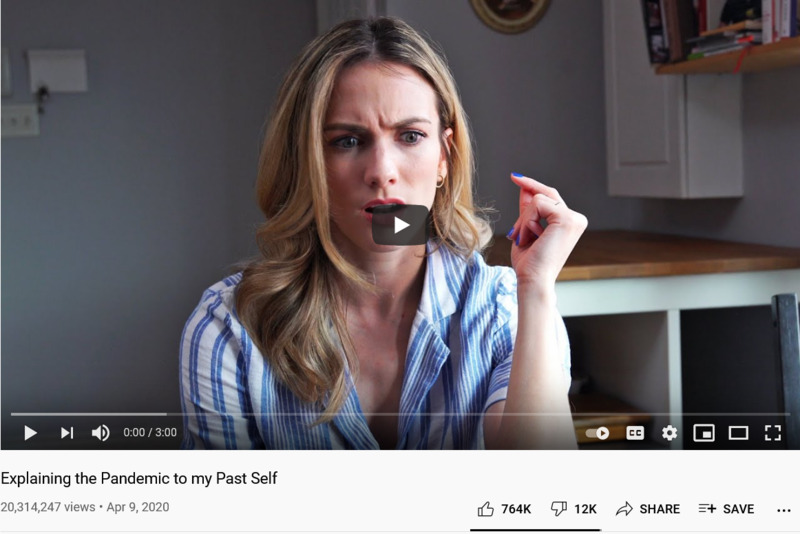
2020-04-09
At the start of 2020, and even into the beginning of March, we had absolutely no idea what was lurking right around the corner. I recently got shown this video, and I thought it did a perfect job of capturing the suddenness of the pandemic. So much happened in only a matter of a few weeks; the shift in what life was and would be like in April compared to January was stark.
-
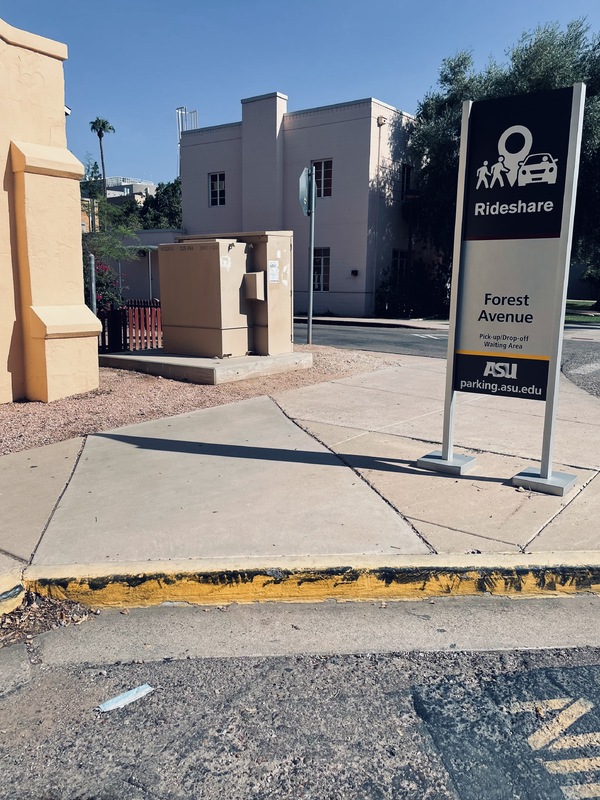
2021-09-03
Mask trash near the pick up-drop off at Forest Ave on ASU's campus.
 2021-09-23
2021-09-23 2021-09-22
2021-09-22 2021-09-23
2021-09-23 2021-09-22
2021-09-22 2021-09-17
2021-09-17 2020-03-07
2020-03-07 2021-09-20
2021-09-20 2021-09-22
2021-09-22 2021-09-22
2021-09-22 2021-09-22
2021-09-22 2021-09-22
2021-09-22 2021-09-24
2021-09-24 2021-07
2021-07 2021-09-21
2021-09-21 2021-02-21
2021-02-21 2021-03-31
2021-03-31 2021-09-21
2021-09-21 2021-03-08T12:38
2021-03-08T12:38 2020
2020 2021-04-19
2021-04-19 2021-09-21
2021-09-21 2021-09-21
2021-09-21 2021-09-21
2021-09-21 2020-03
2020-03 2021-09-17
2021-09-17 2021-09-21
2021-09-21 2021-09-21
2021-09-21 2020-04-01
2020-04-01 2021-08
2021-08 2021-03-18
2021-03-18 2021-09-09
2021-09-09 2021-04-17
2021-04-17 2021-09-20T19:35:00+00:00
2021-09-20T19:35:00+00:00 2021-09-20
2021-09-20 2021-09-20
2021-09-20 2021-09-20
2021-09-20 2021-09-20
2021-09-20 2021-09-17
2021-09-17 2021-09-20
2021-09-20 2021-09-16
2021-09-16 2021-09-20
2021-09-20 2020-09-18
2020-09-18 2020-03
2020-03 2021-08-15
2021-08-15 2021-09-19
2021-09-19 2021-09-18
2021-09-18 2020-04-09
2020-04-09 2021-09-03
2021-09-03